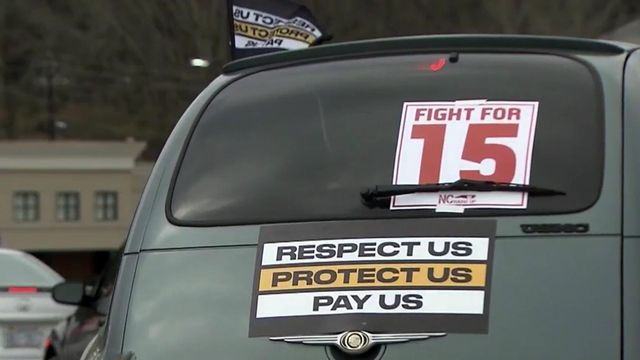In addition to more stimulus checks, Biden's plan calls for $15 minimum wage
President-elect Joe Biden's $1.9 trillion pandemic relief proposal includes a third round of stimulus checks for taxpayers, but it also calls for something not in the packages Congress passed last spring and in December: a $15 minimum wage.
Posted — UpdatedWorkers protesting in Durham on Friday said a higher minimum wage is long overdue.
"I feel like we are completely underpaid for what we go through here," said Umar Benson, who was picketing outside the McDonald's where he works as part of an effort for a $15 minimum wage.
Benson earns $8 an hour and said he can't get by on that. A $15 hourly wage would be life-changing, he said.
"I would be able to get my own place, a simple, small, little apartment or something, maybe even a car or something to help me get around," he said. "That would be beautiful right there."
North Carolina State University economist Mike Walden said the wage increase could help tens of millions of people. But he also warned that employers are turning to technology to replace low-wage workers, and a higher minimum wage could speed up that trend.
"This [could] cause employers to say, 'All right, if I’m going to pay someone $15 an hour and I was paying them $7 an hour, I’m going to look into replacing them on the French fryer or in the meat processing plant,'" Walden said.
The minimum wage increase is just one part of Biden’s economic plan. It also includes a $1,400 stimulus check for most taxpayers and a $400 boost to emergency unemployment benefits through September.
"There’s not a lot in there for businesses. I think it’s really focused on the institutions that the president-elect thinks we need to boost in order to get through this virus, as well as people," Walden said. "It is very heavily focused on households and people, institutions that are front line – education, health care, et cetera."
The package also includes a new national vaccination program, plus money to reopen schools safely and funds to help state and local governments.
That last provision could be the major sticking point in Congress, Walden said.
"The federal government has not done open-ended aid," he said. "The vast majority of that [aid] was targeted – the federal government told the states how to spend it. What states want is open-ended so they can put that into their general fund."
Walden said the package should have no problem passing the House, but it will likely need some Republican votes in the Senate. GOP Senators were against giving money to state and local governments, but many of them were in favor of the additional stimulus checks.
Benson said he also hopes it happens quickly.
"We’re not asking to get rich or anything like that. We’re just asking to get treated fairly," he said.
Related Topics
• Credits
Copyright 2024 by Capitol Broadcasting Company. All rights reserved. This material may not be published, broadcast, rewritten or redistributed.






